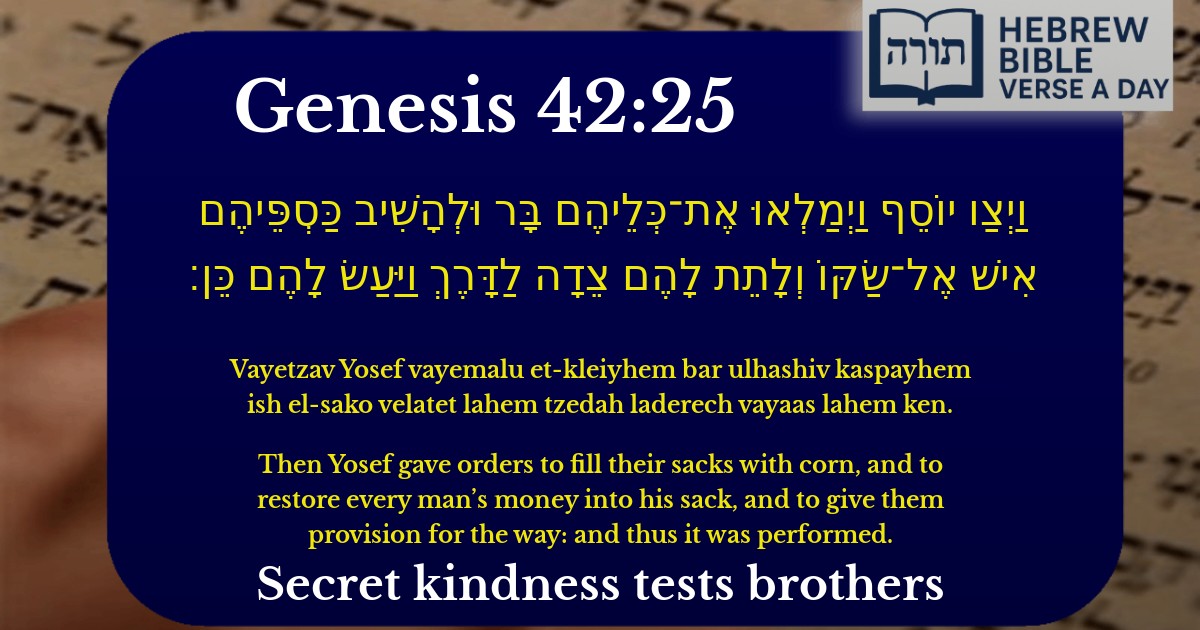Join Our Newsletter To Be Informed When New Videos Are Posted
Join the thousands of fellow Studends who rely on our videos to learn how to read the bible in Hebrew for free!
Hebrew Text
וַיְצַו יוֹסֵף וַיְמַלְאוּ אֶת־כְּלֵיהֶם בָּר וּלְהָשִׁיב כַּסְפֵּיהֶם אִישׁ אֶל־שַׂקּוֹ וְלָתֵת לָהֶם צֵדָה לַדָּרֶךְ וַיַּעַשׂ לָהֶם כֵּן׃
English Translation
Then Yosef gave orders to fill their sacks with corn, and to restore every man’s money into his sack, and to give them provision for the way: and thus it was performed.
Transliteration
Vayetzav Yosef vayemalu et-kleiyhem bar ulhashiv kaspayhem ish el-sako velatet lahem tzedah laderech vayaas lahem ken.
Hebrew Leining Text
וַיְצַ֣ו יוֹסֵ֗ף וַיְמַלְא֣וּ אֶת־כְּלֵיהֶם֮ בָּר֒ וּלְהָשִׁ֤יב כַּסְפֵּיהֶם֙ אִ֣ישׁ אֶל־שַׂקּ֔וֹ וְלָתֵ֥ת לָהֶ֛ם צֵדָ֖ה לַדָּ֑רֶךְ וַיַּ֥עַשׂ לָהֶ֖ם כֵּֽן׃
וַיְצַ֣ו יוֹסֵ֗ף וַיְמַלְא֣וּ אֶת־כְּלֵיהֶם֮ בָּר֒ וּלְהָשִׁ֤יב כַּסְפֵּיהֶם֙ אִ֣ישׁ אֶל־שַׂקּ֔וֹ וְלָתֵ֥ת לָהֶ֛ם צֵדָ֖ה לַדָּ֑רֶךְ וַיַּ֥עַשׂ לָהֶ֖ם כֵּֽן׃
🎵 Listen to leining
Parasha Commentary
📚 Talmud Citations
This verse is not quoted in the Talmud.


Yosef's Actions and Their Significance
The verse describes Yosef's command to fill his brothers' sacks with grain, return their money, and provide them with provisions for their journey. This act is laden with deeper meaning, as interpreted by classical Jewish commentators.
Rashi's Explanation
Rashi (Bereshit 42:25) explains that Yosef's actions were part of a larger plan to test his brothers' character. By returning their money, he created a situation where they would feel compelled to demonstrate honesty when they returned to Egypt. This would reveal whether they had truly repented for their earlier mistreatment of him.
Rambam's Perspective on Divine Providence
Rambam (Moreh Nevuchim 3:36) discusses how Yosef's actions reflect hashgacha pratit (divine providence). Every detail - the returned money, the provisions, and the grain - was orchestrated to bring about the eventual reconciliation between Yosef and his brothers, showing how Hashem guides events toward tikkun (rectification).
Midrashic Insights
Chassidic Interpretation
The Baal Shem Tov teaches that Yosef's actions symbolize how Hashem often provides for us in hidden ways (the returned money in the sacks representing unexpected blessings). The "provision for the way" (צֵדָה לַדָּרֶךְ) represents both physical sustenance and spiritual guidance for life's journey.
Halachic Implications
The Ramban (Bereshit 42:25) discusses how Yosef's actions demonstrate the principle of "darkhei shalom" (ways of peace) - going beyond strict legal requirements to maintain harmonious relationships, even with those who wronged him.